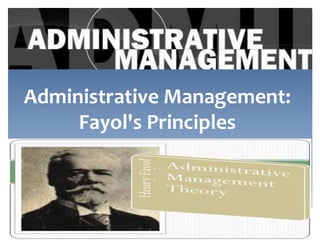
Administrative management: fayol principles of management
- 2. Administrative management is the process of managing information through people. This usually involves performing the storage and distribution of information to those within an organisation. Represent top level management pretaining thinking and planning functions. It performs the function of formulatin of vision,mission and stratagies. ADMINISTRATIVE MANAGEMENT
- 3. Henri Fayol was a French mining engineer. Later he turned out to be a leading industrial and successful manager. He wrote a monograph in French in 1916 titled “General and Industrial Administration”. HENRY FAYOL(1841- 1925)
- 4. He is considered as the Father of Administrative Management Theory. Developed a general theory of business administration that is often called Fayolism. Fayolism- a theory of management that analyzed and synthesized the role of management in organizations.
- 5. 14 Principles of Management Division of Work Authority and Responsibility Discipline Unity of Command Unity of Direction Subordination of Individual Interest to General Interest Remuneration
- 6. Centralization Scalar Chain Equity Order Stability of Tenure of Personnel Initiative Esprit de Corps 14 Principles of Management
- 7. Work should be divided among individuals and groups. When employees are specialized, output can increase because they become increasingly skilled and efficient. It produces more and better work with the same effort. Fayol said that work specialization is the best way to use the human resources of the organisation. Division of Work
- 8. Authority was defined by Fayol as the right to give orders and the power to exact obedience. Responsibility involves being accountable, and is therefore naturally associated with authority. Managers must have the authority to give orders, but they must also keep in mind that with authority comes responsibility. Responsibility is closely related to authority and it arises wherever authority is exercised Authority and Responsibility
- 9. Discipline means obedience to authority, observance of the rules and norms of performance, respect for agreements, sincere efforts for completing the given job, respect for the superiors and the organization, etc. The best means of maintaining discipline are good supervisors at all levels, clear and fair agreements between the employees and the employer, and judicious application of penalties. Discipline
- 10. Each employee should receive instructions about a particular work from one superior only. If there were to be more than one superiors, the employee would be confused due to conflict in instructions. Unity of Command
- 11. Teams with the same objective should be working under the direction of one manager, using one plan. Fayol advocates "One head and one plan" which means that group efforts on a particular plan be led and directed by a single person. This enables effective co-ordination of individual efforts and energy. Unity of Direction
- 12. First priority to general intrest. An individual is always interested in maximizing his own satisfaction through more money, recognition, status, etc. It is very often against the general interest of the organisation. The interests of one employee should not be allowed to become more important than those of the group. Subordination of Individual Interest to General Interest
- 13. According to Fayol wage-rates and method of their payment should be fair, proper and satisfactory. Fair remuneration increases workers’ efficiency and boost their morale. It also plays a vital role in making the relations of the employees and the management better. Fair Remuneration to employees
- 14. Fayol defined centralization as lowering the role and importance of the subordinate role. Decentralization is increasing the importance of subordinate. According to Fayol should be proper and effective adjustment between centralization and decentralization inorder to achieve maximum objectives of the business. Centralization & Decentralization
- 15. Scalar chain is the formal line of authority which moves from highest to lowest rank in a straight line. This chain specifies the route through which the information is to be communicated to the desired location/person. Scalar Chain
- 16. Fayol emphasized that every information in the organization must flow according to this chain to facilitate clear communication of orders of the superiors and feelings of the subordinates. It consumes a lot of time to pass information.
- 17. GANG PLANK
- 18. “right place for everything and right man at right place” There should be proper, systematic and orderly arrangement of physical and social factors, such as land, raw materials, tools and equipments and employees respectively. There should be an orderliness in work through suitable organization of men and materials. Order
- 19. Management should treat all its employees as equally as possible. Managers should be free from all prejudices, personal likes or dislikes. It ensures healthy industrial relations between management and labour. This will create loyalty and devotion among the employees. EQUITY
- 20. Workers should be assured of the security of job by the management. This is important to motivate them and extract better work from them. If they fear for job security, their morale will be low and they cannot give efficient work. Also, they will not have any sense of attachment to the organization and they will always be on the lookout for a job elsewhere. Stability of Tenure of Personnel
- 21. Under this principle, the successful management provides an opportunity to its employees to suggest their new ideas,experiences and more convenient methods of work Employees should be given the necessary level of freedom to create and carry out plans. Employees should be encouraged to make all kinds of suggestions to conceive and carry out their plans. INITIATIVE
- 22. This term means team spirit. Harmony and unity among the employees is a great source of strength to the organization. To achieve this, the motto of divide and rule should be avoided. And, verbal communication should be used for removing misunderstandings. ESPRIT DE CORPS
- 23. Thank you
